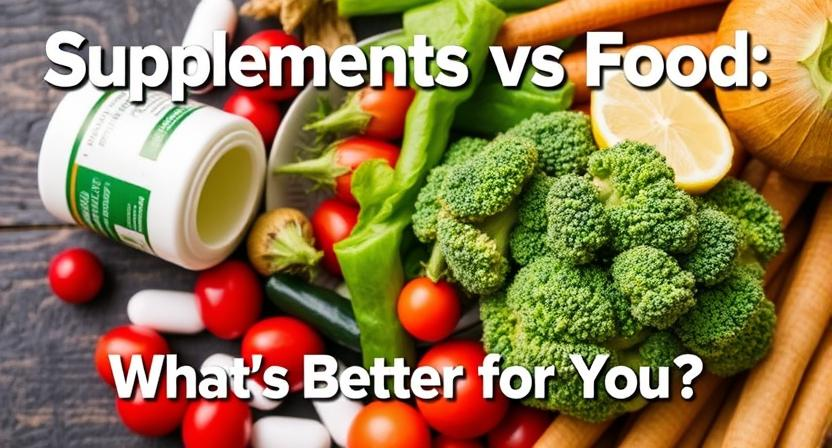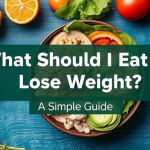When it comes to achieving optimal health and fitness, nutrition plays a crucial role. For years, the debate between supplements and whole foods has been ongoing. As the supplement industry continues to grow and advertise new products with promises of enhancing performance, boosting energy, and improving overall health, many people are left wondering: Are supplements really necessary, or is food the better choice?
In this article, we’ll explore the key differences between supplements and food, their respective benefits, and help you determine which one might be better for you depending on your goals.
What Are Supplements?
Supplements are products designed to complement your diet and provide nutrients that might be missing or insufficient in your daily food intake. They come in various forms, including pills, capsules, powders, liquids, and gummies. Supplements can contain vitamins, minerals, amino acids, herbs, enzymes, or other ingredients aimed at improving overall health, supporting specific functions, or enhancing physical performance.
Some of the most common supplements include:
- Multivitamins: Provide a range of essential vitamins and minerals.
- Protein powders: Offer a concentrated source of protein, typically derived from whey, casein, or plants.
- Creatine: Used to improve performance and muscle strength.
- Fish oil: Rich in omega-3 fatty acids, which promote heart and brain health.
- Probiotics: Promote gut health by adding beneficial bacteria to the digestive system.
While supplements can be a convenient way to ensure you’re meeting your nutritional needs, they should never replace whole foods in your diet.
The Power of Whole Foods
Whole foods, such as fruits, vegetables, lean proteins, whole grains, and healthy fats, are packed with a wide range of nutrients and offer health benefits beyond what supplements can provide. Unlike supplements, whole foods contain a complex mixture of nutrients that work synergistically, improving overall absorption and bioavailability.
Some key benefits of whole foods include:
- Nutrient density: Whole foods are rich in vitamins, minerals, antioxidants, fiber, and other essential nutrients that are vital for health.
- Variety of micronutrients: Whole foods provide a broader spectrum of nutrients that are often found in combination, making it easier for your body to absorb and utilize them effectively.
- Fiber content: Fruits, vegetables, legumes, and whole grains are excellent sources of dietary fiber, which is essential for digestive health and weight management.
- Better absorption: Many nutrients in whole foods are more easily absorbed by the body because they come in their natural, unprocessed form.
Supplements vs. Food: Key Differences
Now that we have an understanding of what both supplements and whole foods offer, let’s compare the two more closely in terms of their benefits, drawbacks, and best use cases.
1. Nutrient Absorption
While supplements can provide concentrated doses of specific nutrients, they often lack the synergistic benefits found in whole foods. When you consume nutrients through whole foods, they come with other compounds (such as fiber, phytonutrients, and enzymes) that improve the absorption and effectiveness of those nutrients. For example, vitamin C from oranges is better absorbed with the presence of natural fiber, while the antioxidants found in berries work together to boost your body’s defenses.
On the other hand, supplements often provide a single nutrient, which might not be as effective as getting it from food due to the lack of these supporting compounds. Furthermore, the body may not always absorb supplements as well as it does nutrients from whole foods.
2. Convenience
One of the most significant advantages of supplements is their convenience. If you’re on a tight schedule or have difficulty getting enough of a specific nutrient through food, supplements can be a quick and efficient way to meet your needs. For instance, protein powder can be a convenient solution for individuals who struggle to meet their protein requirements through whole food sources alone.
Supplements are also beneficial for people with specific dietary restrictions (such as vegans or individuals with food allergies), as they can provide nutrients that may be difficult to obtain from food alone. For example, a vitamin B12 supplement can help vegans who avoid animal products and are at risk of deficiency.
However, while supplements can be convenient, they should not be used as a long-term replacement for a healthy diet rich in whole foods.
3. Cost
The cost of supplements can vary greatly depending on the type and brand. High-quality supplements, especially those with proven efficacy, can be expensive. For instance, protein powders and pre-workout supplements can add up quickly, especially if you’re consuming them regularly.
Whole foods, on the other hand, can often provide a more affordable and sustainable approach to nutrition. While some nutrient-dense foods may be costly, there are many affordable options (such as beans, lentils, oats, and vegetables) that provide a wealth of vitamins and minerals without breaking the bank.
4. Health Risks and Side Effects
While supplements can be beneficial when used appropriately, they also come with potential risks. Overconsumption of certain vitamins and minerals can lead to toxicity. For example, excessive vitamin A intake from supplements can cause liver damage, while too much iron can lead to digestive issues and other health problems. In some cases, supplements can also interact with medications, leading to adverse effects.
Whole foods, by contrast, have a much lower risk of toxicity since they provide nutrients in natural and balanced proportions. Eating a variety of whole foods is generally considered the safest way to ensure you’re getting the right nutrients without the risk of overdoing it.
5. Supporting Specific Health Goals
When it comes to supporting specific health or fitness goals, supplements can be beneficial in certain scenarios. For example, athletes or bodybuilders often use protein powders, creatine, or branched-chain amino acids (BCAAs) to boost muscle growth and recovery. Supplements like fish oil can support heart health, while probiotics promote gut health.
However, for most people, meeting these goals through a well-rounded, nutrient-dense diet is possible. A balanced diet rich in lean proteins, healthy fats, whole grains, and fruits and vegetables can provide all the nutrients your body needs to thrive, while also supporting your fitness and health goals.
Which Is Better: Supplements or Food?
Ultimately, the answer depends on your individual circumstances, goals, and lifestyle. Whole foods should always be the foundation of your diet. They provide a broad spectrum of nutrients that work together to support overall health and well-being. No supplement can replace the benefits of eating a variety of whole foods that are rich in vitamins, minerals, fiber, and antioxidants.
Supplements, however, can be beneficial in certain situations, such as:
- When you have specific nutrient deficiencies.
- When you are following a restrictive diet (e.g., vegan, gluten-free) and may have trouble getting enough nutrients.
- When you have increased nutritional needs due to intense physical activity, age, or medical conditions.
- When you need a convenient and quick way to support your health or fitness goals.
If you’re healthy, have a balanced diet, and are not aiming for specific fitness goals, it’s generally best to focus on whole foods rather than supplements. However, if you’re trying to fill nutritional gaps, supplements can play a helpful role when used appropriately.
Conclusion
In the battle of supplements vs. food, there is no clear winner. Both have their place in a healthy lifestyle, but food should always be the foundation of your diet. Whole foods offer a wide range of nutrients that supplements simply cannot match. Supplements, while convenient and effective in certain situations, should never replace the role of nutritious, whole foods.
If you’re considering taking supplements, it’s important to evaluate your individual needs and goals. When in doubt, consult with a healthcare professional or nutritionist to determine the best approach for your health and fitness journey.






Leave a Reply